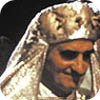
| Eisteddfod
An eisteddfod (from the Welsh verb-noun eistedd, "sit"; the plural is eisteddfodau) is a typically Welsh festival of literature, music and performance. The tradition of such a meeting of Welsh artists dates back to at least the 12th century when a festival of poetry and music was held by Rhys ap Gruffydd of Deheubarth at his court in Cardigan in 1176, but with the decline of the bardic tradition fell into abeyance. The present-day format owes much to an eighteenth century revival arising out of a number of informal eisteddfodau.
The National Eisteddfod
The most important eisteddfod is the National Eisteddfod, held annually in the first week of August and usually alternating between North and South Wales, and taking place entirely in the Welsh language. Hundreds of tents, pavilions and little stands are erected in an open space to create the maes (field). The space required for this means that it is rare for the eisteddfod to be in a city or town itself but instead somewhere with more space. The car parking for day visitors alone requires several large fields and many people camp there for the whole week. In addition, if no stone circle is there already, one is created. The festival has a heavy druidic flavor, with the crowning and chairing ceremonies for the victorious poets being attended by bards in flowing white costumes, dancing maidens, trumpet fanfares and a symbolic horn of plenty. However, the heritage of this ceremony is of dubious provenance and owes its existence within the Eisteddfod structure to Iolo Morganwg, whose Gorsedd ceremonies were adopted by the Eisteddfod from 1819.
Nevertheless, it is taken very seriously, and an award of a crown or a chair for poetry is a great honour. One of the most dramatic events in Eisteddfod history was the award of the 1917 chair to the poet Ellis Humphrey Evans, bardic name Hedd Wyn, for the poem Yr Arwr (The Hero). The winner was announced, and the crowd waited for the winner to stand up to accept the traditional congratulations before the chairing ceremony, but no winner appeared. It was then announced that Hedd Wyn had been killed the previous month on the battlefield in Belgium. These events were portrayed in the Academy Award nominated film Hedd Wyn.
As well as the main pavilion with the main stage, other fixtures of the Eisteddfod maes are the Pabell L�n (literature pavilion), the Neuadd Ddawns (dance hall), the Pabell Wyddoniaeth a Thechnoleg (science and technology pavilion), at least one theatre, and hundreds of stands, stondinau, where groups, societies, councils, charities and shops exhibit and sell. Some eisteddfod-goers never go near the main pavilion, spending their time wandering the maes and meeting friends. Since 2004, alcohol has been sold on the maes: prior to this, a no-alcohol policy was in operation. In addition to the main field, there are other venues through the week: one of these, Maes B, is where gigs are held.
The location of each national eisteddfod is proclaimed a year in advance, at which time the themes and texts for the competitions are published.
The Urdd Eisteddfod
Another important eisteddfod in the calendar is 'Eisteddfod Yr Urdd', or the youth eisteddfod. Organised by Urdd Gobaith Cymru, the Youth League of Wales, it brings together children from the age of 7, up to young adults of 24, from all across Wales, for a week of competition of singing, recitation, dancing, acting and musicianship in the summer half-term school holiday. Regional heats are held in advance of the final competition. As with the national eisteddfod, the Urdd Eisteddfod moves location, although with the establishment of the Urdd headquarters in the Wales Millennium Centre, the eisteddfod will return to Cardiff every four years.
The International Eisteddfod
Another Eisteddfod is the International Eisteddfod, held annually in Llangollen. Choirs, singing groups, folk dancers and other groups attend from all over the world, sharing their national folk traditions in one of the world's great festivals of the arts. It was set up in 1947 and begins with a message of peace. In 2004, the eisteddfod was (unsuccessfully) nominated for the Nobel Peace Prize by Terry Waite, who has been actively involved with the eisteddfod.
Other eisteddfodau
Smaller-scale local eisteddfodau are held throughout Wales: advertisements for them may appear in the back of the newspapers or on posters locally. Schools hold eisteddfodau as competitions within the school: a popular time for this is on Saint David's Day. |
